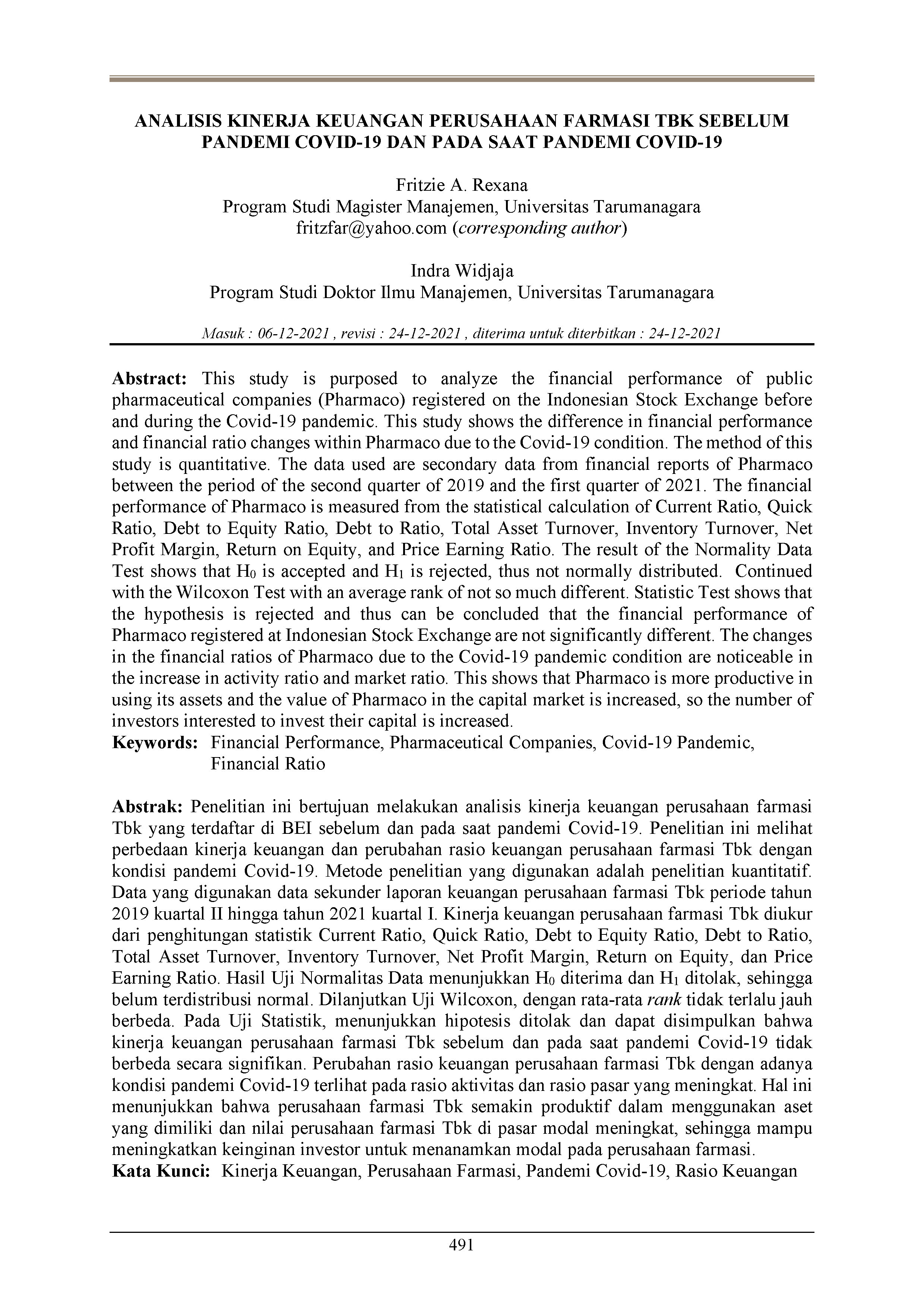Analisis Kinerja Keuangan Perusahaan Farmasi Tbk sebelum Pandemi Covid-19 dan pada Saat Pandemi Covid-19
Main Article Content
Abstract
This study is purposed to analyze the financial performance of public pharmaceutical companies (Pharmaco) registered on the Indonesian Stock Exchange before and during the Covid-19 pandemic. This study shows the difference in financial performance and financial ratio changes within Pharmaco due to the Covid-19 condition. The method of this study is quantitative. The data used are secondary data from financial reports of Pharmaco between the period of the second quarter of 2019 and the first quarter of 2021. The financial performance of Pharmaco is measured from the statistical calculation of Current Ratio, Quick Ratio, Debt to Equity Ratio, Debt to Ratio, Total Asset Turnover, Inventory Turnover, Net Profit Margin, Return on Equity, and Price Earning Ratio. The result of the Normality Data Test shows that H0 is accepted and H1 is rejected, thus not normally distributed. Continued with the Wilcoxon Test with an average rank of not so much different. Statistic Test shows that the hypothesis is rejected and thus can be concluded that the financial performance of Pharmaco registered at Indonesian Stock Exchange are not significantly different. The changes in the financial ratios of Pharmaco due to the Covid-19 pandemic condition are noticeable in the increase in activity ratio and market ratio. This shows that Pharmaco is more productive in using its assets and the value of Pharmaco in the capital market is increased, so the number of investors interested to invest their capital is increased.
Penelitian ini bertujuan melakukan analisis kinerja keuangan perusahaan farmasi Tbk yang terdaftar di BEI sebelum dan pada saat pandemi Covid-19. Penelitian ini melihat perbedaan kinerja keuangan dan perubahan rasio keuangan perusahaan farmasi Tbk dengan kondisi pandemi Covid-19. Metode penelitian yang digunakan adalah penelitian kuantitatif. Data yang digunakan data sekunder laporan keuangan perusahaan farmasi Tbk periode tahun 2019 kuartal II hingga tahun 2021 kuartal I. Kinerja keuangan perusahaan farmasi Tbk diukur dari penghitungan statistik Current Ratio, Quick Ratio, Debt to Equity Ratio, Debt to Ratio, Total Asset Turnover, Inventory Turnover, Net Profit Margin, Return on Equity, dan Price Earning Ratio. Hasil Uji Normalitas Data menunjukkan H0 diterima dan H1 ditolak, sehingga belum terdistribusi normal. Dilanjutkan Uji Wilcoxon, dengan rata-rata rank tidak terlalu jauh berbeda. Pada Uji Statistik, menunjukkan hipotesis ditolak dan dapat disimpulkan bahwa kinerja keuangan perusahaan farmasi Tbk sebelum dan pada saat pandemi Covid-19 tidak berbeda secara signifikan. Perubahan rasio keuangan perusahaan farmasi Tbk dengan adanya kondisi pandemi Covid-19 terlihat pada rasio aktivitas dan rasio pasar yang meningkat. Hal ini menunjukkan bahwa perusahaan farmasi Tbk semakin produktif dalam menggunakan aset yang dimiliki dan nilai perusahaan farmasi Tbk di pasar modal meningkat, sehingga mampu meningkatkan keinginan investor untuk menanamkan modal pada perusahaan farmasi.
Article Details

This work is licensed under a Creative Commons Attribution-NonCommercial-ShareAlike 4.0 International License.
This work is licensed under a Jurnal Manajemen Bisnis dan Kewirausahaan Creative Commons Attribution-ShareAlike 4.0 International License.
References
Al-Nasser, N. M. (2014). The impact of financial analysis in maximizing the firm’s value “A case study on the Jordanian industrial companies.” International Journal of Managerial Studies and Research, 2(6), 1–9. https://www.arcjournals.org/pdfs/ijmsr/v2-i6/1.pdf
Alcan, G., Guvenbas, S. D., & Ozdurak, C. (2020). The impact of COVID-19 to global pharmaceuticals and biotechnology company stocks returns. Pressacademia, 9(2), 68–79. https://doi.org/10.17261/pressacademia.2020.1215
Anggreini, D., & Utiyati, S. (2019). Pengaruh ROA, ROE dan PER terhadap harga saham pada perusahaan farmasi. Jurnal Ilmu Dan Riset Manajemen, 8(3), 1–15. http://jurnalmahasiswa.stiesia.ac.id/index.php/jirm/article/view/1233
Daryanto, C., & Daryanto, W. M. (2019). Financial performance analysis and evaluation of pharmaceutical companies in Indonesia. International Journal of Innovation, Creativity and Change, 6(3), 207–224. https://www.ijicc.net/images/Vol6Iss3/6314_Daryanto_2019_TD_R1.pdf
Elek, P., Bíró, A., & Fadgyas-Freyler, P. (2021). Income gradient of pharmaceutical panic buying at the outbreak of the COVID-19 pandemic. Health Economics (United Kingdom), 30(9), 2312–2320. https://doi.org/10.1002/hec.4378
Endri, Susanti, D., Hutabarat, L., Simanjuntak, T. P., & Handayani, S. (2020). Financial performance evaluation: Empirical evidence of pharmaceutical companies in Indonesia. Systematic Reviews in Pharmacy, 11(6), 803–816. https://doi.org/10.31838/srp.2020.6.117
Enekwe, C. I. (2015). The relationship between financial ratio analysis and corporate profitability: A study of selected quoted oil and gas companies in Nigeria. European Journal of Accounting, Auditing and Finance Research, 3(2), 17–34. http://www.eajournals.org/wp-content/uploads/The-Relationship-between-Financial-Ratio-Analysis-and-Corporate-Profitability-A-Study-of-Selected-Quoted-Oil-and-Gas-Companies-in-Nigeria.pdf
Erica, D. (2017). Analisa rasio laporan keuangan untuk menilai kinerja perusahaan PT Semen Indonesia Tbk (Persero). Perspektif: Jurnal Ekonomi dan Manajemen Akademi Bina Sarana Informatika, 15(2), 89–94. https://ejournal.bsi.ac.id/ejurnal/index.php/perspektif/article/download/2088/1578
Gitman, L. J., & Zutter, C. J. (2010). Principles of managerial finance (13th ed.). Pearson Education.
Hashemian-Rahaghi, S.-R., Fan Fah, C., & Abed-Ashtiani, F. (2019). Production efficiency and financial performance in pharmaceutical industry: A case of top 24 companies. SSRN Electronic Journal, 1–20. https://doi.org/10.2139/ssrn.3437210
Kementerian Perindustrian Republik Indonesia. (2015). Rencana induk pembangunan industri nasional. https://www.kemenperin.go.id/ripin.pdf
Kementerian PPN/Bappenas. (2020). Perkembangan ekonomi Indonesia dan dunia (Ancaman resesi dunia akibat pandemi) triwulan I tahun 2020 (Vol. 4, Issue 1). https://perpustakaan.bappenas.go.id/e-library/file_upload/koleksi/migrasi-data-publikasi/file/Policy_Paper/ND_269_Penyampaian_Laporan_Perkembangan_Ekonomi_Indonesia_dan_Dunia_untuk_Triwulan_I_Tahun_2020.pdf
Lim, H., & Rokhim, R. (2020). Factors affecting profitability of pharmaceutical company: An Indonesian evidence. Journal of Economic Studies, 48(5), 981–995. https://doi.org/10.1108/JES-01-2020-0021
Nicola, M., Alsafi, Z., Sohrabi, C., Kerwan, A., Al-Jabir, A., Iosifidis, C., Agha, M., & Agha, R. (2020). The socio-economic implications of the coronavirus pandemic (COVID-19): A review. International Journal of Surgery, 78, 185–193. https://doi.org/10.1016/j.ijsu.2020.04.018
Pitaloka, H., Umar, A. U. A. Al, Hartati, E. R., & Fitria, D. (2020). The economic impact of the COVID-19 outbreak: Evidence from Indonesia. Jurnal Inovasi Ekonomi, 5(2), 71–76. https://doi.org/10.22219/jiko.v5i02.11833
Prinja, S., & Pandav, C. S. (2020). Economics of COVID-19: Challenges and the way forward for health policy during and after the pandemic. Indian Journal of Public Health, 64, S231–S233. https://doi.org/10.4103/ijph.IJPH_524_20
Suminar, A. (2020). Dampak Covid-19 terhadap ekonomi global 2020. Suarasurabaya.net. https://www.suarasurabaya.net/ekonomibisnis/2020/dampak-covid-19-terhadap-ekonomi-global-2020/?amp


